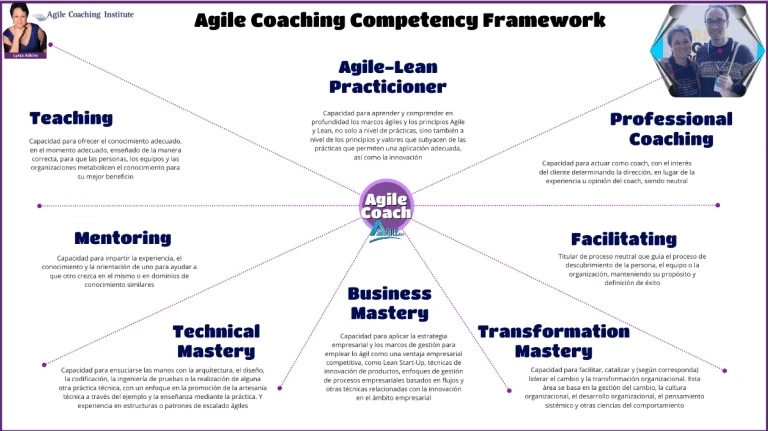In January 2020, I had a phone interview for an agile transformation project with a leader from a Barcelona-based company who was interested in agile coaching.
The interviewer asked me if I would like to launch into a coaching conversation and I accepted.
For the next few minutes, I did my best to put on a professional coach hat, although in the end, my attempt did not demonstrate the capabilities that the transformation leader was looking for. What went wrong?
Parallel to the telephone interview, I was starting my coaching program at ICF, an intensive 9-month program.
Part of the curriculum involved demonstrating coaching ability and required recorded sessions to work with clients through the coaching arc.
The organization I was trying to lead an agile transformation with at the time had no experience in professional coaching conversations.
Again, I hit a brick wall. I was frustrated and started to take the issue personally. I know certified agile coach practices quite well; why this coaching was so problematic to consolidate in an organization?
How do I see it from my experience?
In my personal work experience, from start-ups to large companies, I have rarely witnessed an agile coaching conversation in action, rarely have I seen its use as a priority for organizational change.
The leader, whom I interviewed, was a rare treasure buried in the sand. When I spoke to him about coaching skills, I was referring to what the International Coach Federation (ICF) defines as collaborating with clients in a creative process that invites reflection and inspires them to maximize their personal and professional potential.
As part of client engagement, I am strictly referring to the use of the coaching bow. We attach an image of that arch as we understand it.
Since I have worked alongside several people who call themselves Agile Coaches, most of the time I have not witnessed the arc in action. I feel that the expectation of the Agile Coaching industry on paper is different from reality.
The arc of a professional coaching session
On the other hand, I frequently witness and come across the other three positions of the Agile Coaching Competency Framework many times. Those competencies are teaching, mentoring and facilitation. Coaching is not present in most occasions. Unfortunately, that's what they end up calling Agile Coaching.
I have also witnessed many times that organizations assign a coach who imposes goals defined by the organization itself to their coachee in question. This goes beyond the codes of ethics that professional coaches have in the development of their work.
Although the coaching competence is one more quadrant of the framework, it does not mean that it does not have a code of ethics.
Mentoring is usually the interpretation of many organizations about what an Agile Coach does.
Regardless of agile maturity, if they have, organizations seem to gravitate to and embrace the other three attributes teaching, mentoring, and facilitation much more than coaching competence. Why is this?
Some observations on agile coaching
Again, through my observation, I believe that organizations in the medium and low agile maturity ranges are not ready for honest coaching conversations.
When executives employ an Enterprise Agile Coach, this act generally indicates an acknowledgment that internal change must occur within the system.
And an authentic coaching conversation will expose gaps that some leaders want buried.
Exposure can reveal vulnerabilities and loss of power for that leader, especially in a command and control type environment.
Real change scares some people. I have witnessed firsthand how far some leaders go to maintain the business at hand and protect their kingdom by cultivating the illusion of false control.
Most of the job openings for agile coaches focus on mastery knowledge of agility rather than coaching posture.
If coaching conversations are a requirement, the next time you see an open Agile Coach position, see what kind of language the organization uses to describe core competencies.
Companies try to make up what they are not, yet the job descriptions reveal their level of maturity for an Agile Coach.
What's more, many organizations try to sell an image that they are agile because it gives them a differentiation in the market to attract talent and business. Many times they do not even bother to define the advantages that consolidating a good business agility practice would really give them.
If your organization has a training budget, see what happens if you request approval to take a professional coaching program, such as CoActive or the International Coaching Federation.
The way the employer responds indicates the organization's agile maturity and understanding of the role of an agile coach.
Conclusions
Over time, I have noticed a trend where most organizations hire an agile coach but want an expert in mastering agility in a specific area such as Agile Transformation, Scrum, Kanban, XP, or even SAFe. One avenue is to elevate a Senior Scrum Master who has in-depth knowledge in a particular area such as Scrum to an Agile Coach role. They end up seeing that the Agile Coach is the head of the Scrum Masters and it shouldn't be that way. Worse still when someone is given the title of Enterprise Agile Coach and they see him as the head of the Agile Coaches who is also the head of the senior Scrum Master. As you can see, they do not worry about the benefits that a good implementation of agility can bring, using the Agile Coaching Competency Framework for what it really serves, which is to know the skills of a change leader and how they can transform them into consolidated competencies in the culture of the organization.
Resource: https://www.scrum.org/resources/blog/es-hora-de-repensar-el-coaching-en-agile-coaching


